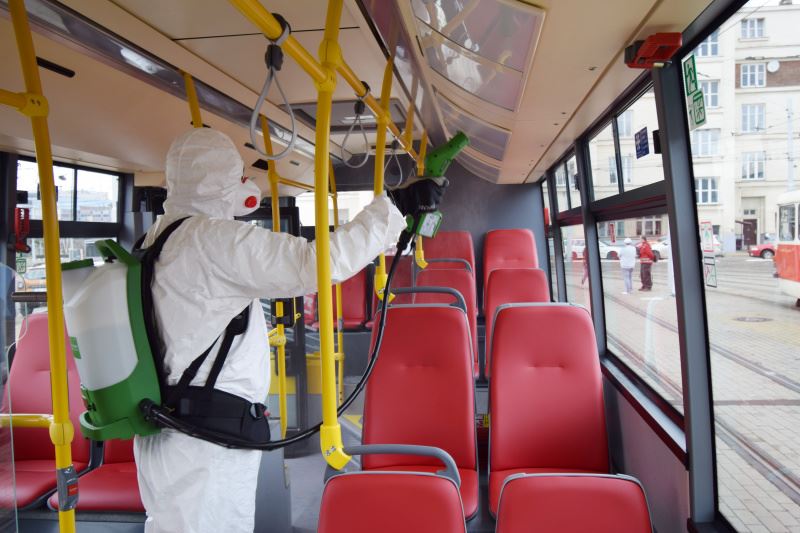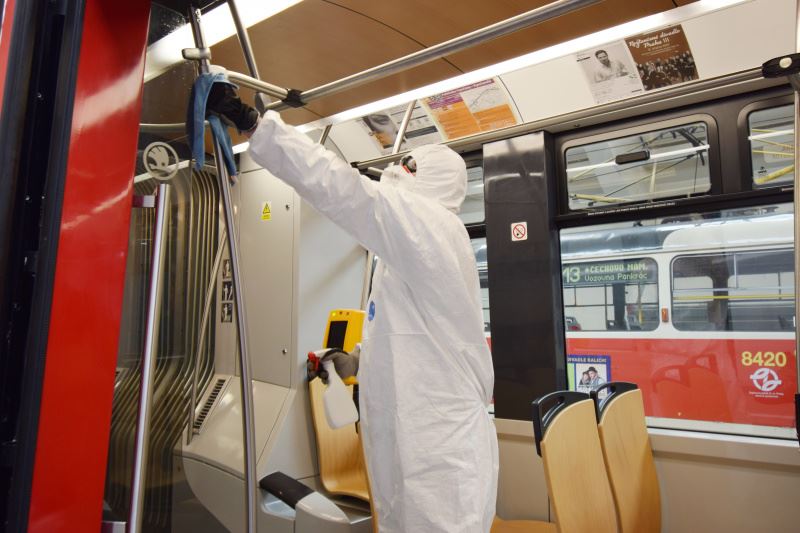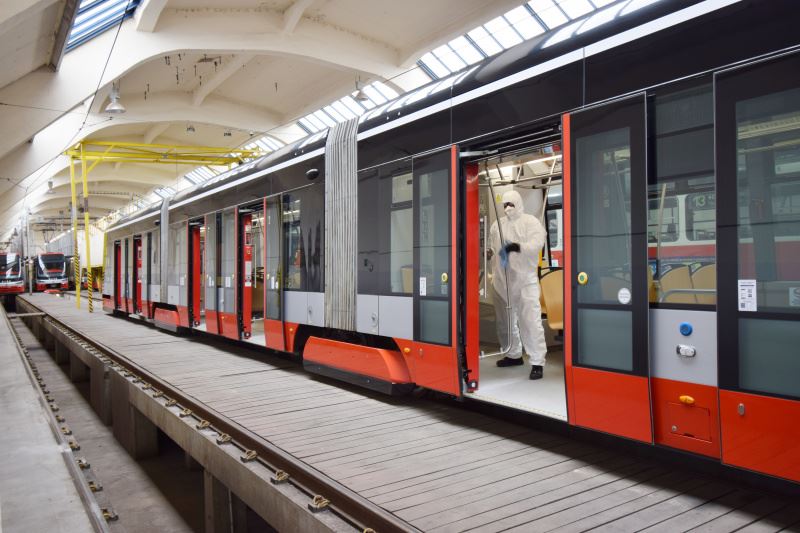The Prague Public Transit Company (DPP) is testing two different disinfectants based on nanopolymers that can eliminate bacteria, viruses, yeasts, molds and other microorganisms with a declared effect of up to 21 days.
Two trams and one bus will be used to verify their effect for the next 14 days in normal operation in Prague public transport. Both products use the latest trends in nanotechnology have health certificates from the National Institute of Public Health and meet not only the relevant Czech national but also European standards, according to the DPP.
After two weeks, DPP will evaluate their effectiveness based on microbiological analysis and, if their long-term antibacterial and antiviral effect is confirmed, DPP will apply the products to its fleet. Despite higher unit costs per square meter, this would significantly improve the cleaning of buses, trams and metro trains and the reduce the use of conventional chemicals.

Two 15T trams on line 18 and one SOR NB 12D DPP bus will operate in Prague with a new antibacterial and antiviral nanopolymer preparations in the entire interior. The tram with registration number 9237 has a thin, invisible layer of Impaguard GCA based on ethyl acetate, manufactured by HF Servis, on the sidewalls, all seats, their handles, glass, doors or restraint systems. The tram with registration number 9224 and bus number 3962 have interiors coated with PolyHMG based on the cationic polyhexamethylene guanidine polymer manufactured by Wero Water Service.
Both new formulations have been tested for effectiveness for 21 days, while the effectiveness of conventional detergents or disinfectants is in the order of dozens of minutes or hours. They are broad-spectrum, killing bacterial pathogens such as Escheria coli, Salmonella typhimurium, Stapylococcus aureus, Streptococcus pyogenes, tuberculosis bacteria, yeasts and fungi, and in the case of PolyHMG also viruses.
They are non-flammable, stable, colorless, fragrance-free, do not endanger human or animal health or safety, do not irritate eyes, mucous membranes or cause allergies, work in low (up to 0 ° C) or high temperatures (up to 100 ° C), do not damage materials, are not corrosive, do not contain alcohol or aldehydes or phenols and, last but not least, they are biodegradable, DPP stated in a press release.

“I want the DPP to be a flagship among transport companies in the Czech Republic in both the comfort and accessibility of transport, as well as in testing and using the modern technologies offered by the 21st century. Modern technologies are emerging in the field of various industries including cleaning and antibacterial products. We will now test them in Prague,” Deputy Mayor Adam Scheinherr (Praha Sobě), who is also chairman of the supervisory board of DPP.
Petr Witowski, chairman and CEO of DPP, said smart public transport means not only focusing on the latest IT technologies or types of transport, but also applying the latest knowledge in other important areas – such as maintenance and cleaning. “Indeed, disinfection or proper hygiene is one of the most inflexible words these days. Our goal is to have smart public transport in all respects, including cleaning and disinfection. By creating a comfortable, clean and safe environment, we will increase the comfort of today’s passengers and we can also attract people who still look at it through their fingers,” he said.
“That’s why we decided test the latest trends in cleaning and disinfection in Prague. If the declared effectiveness of the products is confirmed, we would like to apply them within our fleet. In addition to the positive effect for both passengers and our employees, it can greatly streamline and simplify cleaning and interior cleaning, increase disinfection effect and ultimately reduce costs,” he added.

Before the application of protective nanopolymers, DPP first carried out smears from the interiors of buses and trams, which will be used for microbiological analysis. After two weeks in normal operation with the applied antibacterial and antiviral coatings, DPP will make new smears and analysis to see the concentration and composition of microorganisms. The results of both smears will serve to evaluate the effectiveness of the coatings in normal operation.
All interior surfaces must be thoroughly degreased, ideally twice, before applying the nanopolymer layer. The antibacterial and antiviral agent is then applied in two layers with a spray gun and spread across the surface with a sponge in a cross-wise manner so that no space is left untreated. The polymerization takes about half an hour.
The average yield of one liter of the product is 60 to 75 square meters, while the usable area of a standard 12-meter bus is approximately 105 sqm, for a 15T tram it is approximately 217 sqm. For example, for a single disinfection of all 15T trams, DPP would need nearly 1,810 liters.
Currently, DPP has 818 trams, of which 243 are model 15T. DPP also operates 1,161 buses. There are 34 tram routes and 145 bus routes.












 Reading time: 4 minutes
Reading time: 4 minutes 





























